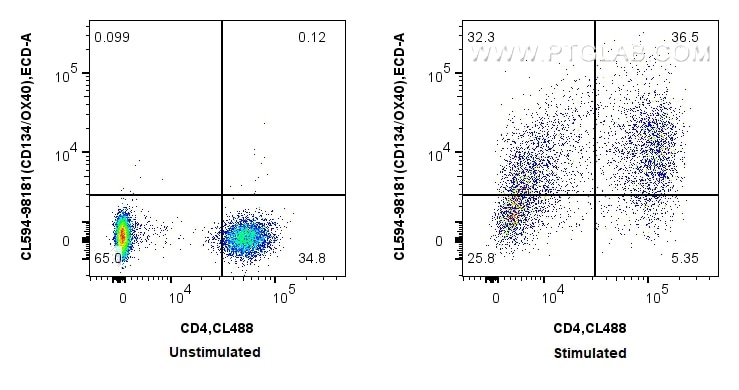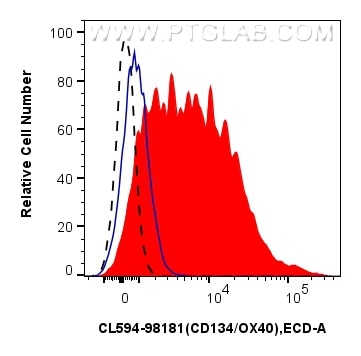Validation Data Gallery
Tested Applications
| Positive FC detected in | PHA-treated human PBMCs |
Recommended dilution
| Application | Dilution |
|---|---|
| Flow Cytometry (FC) | FC : 5 ul per 10^6 cells in 100 μl suspension |
| This reagent has been pre-titrated and tested for flow cytometric analysis. The suggested use of this reagent is 5 ul per 10^6 cells in a 100 µl suspension or 5 ul per 100 µl of whole blood. | |
| Sample-dependent, Check data in validation data gallery. | |
Product Information
CL594-98181 targets CD134/OX40 in FC applications and shows reactivity with human samples.
| Tested Reactivity | human |
| Host / Isotype | Rabbit / IgG |
| Class | Recombinant |
| Type | Antibody |
| Immunogen | CD134/OX40 fusion protein Eg1261 相同性解析による交差性が予測される生物種 |
| Full Name | tumor necrosis factor receptor superfamily, member 4 |
| Calculated molecular weight | 29 kDa |
| GenBank accession number | NM_003327 |
| Gene Symbol | CD134 |
| Gene ID (NCBI) | 7293 |
| Conjugate | CoraLite®594 Fluorescent Dye |
| Excitation/Emission maxima wavelengths | 588 nm / 604 nm |
| Form | Liquid |
| Purification Method | Protein A purification |
| UNIPROT ID | P43489 |
| Storage Buffer | PBS with 0.09% sodium azide and 0.5% BSA{{ptg:BufferTemp}}7.3 |
| Storage Conditions | Store at 2-8°C. Avoid exposure to light. Stable for one year after shipment. |
Background Information
CD134, also known as OX40 and TNFRSF4, is a member of the TNFR-superfamily of receptors (PMID: 2828930; 9766631). It is a type I transmembrane protein predominantly expressed on activated T cells which include CD4 and CD8 T cells, Th2, Th1, and Th17 cells, as well as regulatory T cells (Tregs) (PMID: 20307208). CD134 is activated by its cognate ligand CD134L (OX40L) and functions as a T cell co-stimulatory molecule (PMID: 26215166). CD134-CD134L interactions have been proposed as a potential therapeutic target for treating autoimmune diseases, cancer and infectious disease (PMID: 26215166; 19426222).
Protocols
| Product Specific Protocols | |
|---|---|
| FC protocol for CL594 CD134/OX40 antibody CL594-98181 | Download protocol |
| Standard Protocols | |
|---|---|
| Click here to view our Standard Protocols |

